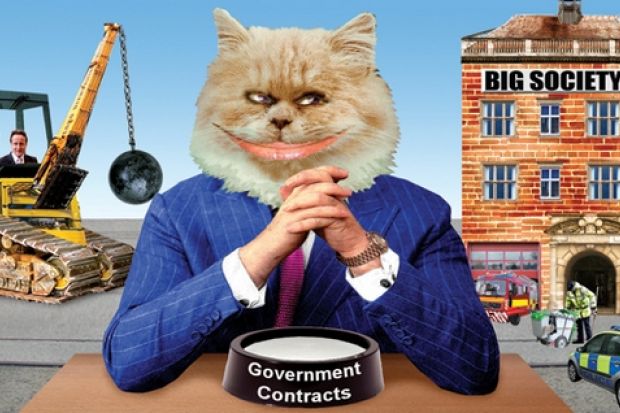David Cameron says he wants us to embrace the Big Society. Or was it "brace yourselves for the Big Society"? One of the two, anyway. People keep asking what he means by the term. On Mondays, he means we should all help old ladies across the road to the workhouse. On Tuesdays, we should do the same for old men. He doesn't know what it means for the rest of the week, but he's working on it. The basic principle is that we must do more to make Britain a better place. Unfortunately that will have to wait until the general election, by which time it may be too late.
Dispatches (Britain's Secret Fat Cats, Channel 4, Monday 14 March, 8pm) provided a glimpse of what's in store until then. Suffice it to say that knife culture is thriving in Whitehall. The welfare state is about to suffer the same fate as Julius Caesar. But ministers tell us they have no other choice. And they are all honourable men. Francis Maude said our budget deficit is the biggest in the developed world, which brought a tear of pride to my eye. But only for a moment. It turns out that our deficit is smaller than that of a number of countries, including America. Can't we come first at anything?
Cameron's master plan is to get private companies to provide public services. This would be cheaper and more efficient. Reporter Ben Laurance made a pilgrimage to Canterbury to witness the miracle of outsourcing. Once the council emptied the bins, tidied the streets and cleaned up the graffiti, but now Serco does all that. And the coalition government wants companies like it to do even more. But what do they get out of it, apart from the warm glow that comes from helping others?
Money, of course. Pots of it. Last year, Serco's profits were up by a third and it had £16 billion on its order books. How could it be doing so well in the depths of a recession? Well, it's all thanks to something called a "memorandum of understanding". This is an agreement between ministers and the private providers. The providers lower their prices in exchange for the right to run more services. Ben tried to get the details of the deal but was told he couldn't have them because they were "commercially sensitive". This was followed by a shot of Cameron telling viewers of his ambition to make his one of the most transparent governments in the world. If by that he meant that we can see right through it, then he has succeeded.
Which is more than can be said for Connaught Partnerships. It had a contract with Norwich City Council to provide maintenance services to social housing associations. The reason it got the work was that it charged less than its competitors. Cheap? Yes. Efficient? No. There were neither the men nor the equipment to carry out the repairs adequately and Connaught went bust. Welcome to the future.
But how did we get here? Niall Ferguson's Civilization: Is the West History? (Channel 4, Sunday 20 March, 8pm) is an attempt to answer that very question. In the first episode the answer was competition, in the second it was science and in the third it was democracy. The rest of what he calls his "killer applications" will be revealed over the next three weeks, but so far there's been no clue as to why he calls them that.
"This is a tale of two ships," Niall began. The first went to South America, the second to North America. Francisco Pizarro, the conqueror of Peru, was in one and a labourer called Abraham Smith was in the other. Niall preferred to travel by plane. We saw him looking dreamily out of the window at clouds. Why, he pondered, did North America become a more successful society than South America, which was more fertile and contained greater natural resources? Was it because Abraham believed in the Big Society and Pizarro didn't?
No, both men happily dispatched the native inhabitants of both countries and robbed them of their lands. We were treated to a few scenes of slaughter which Niall took in his stride. You can't make a civilisation without breaking a few heads. And neither man was averse to owning slaves. What separated the two men was not greed but government. The possession of property and the right to vote laid the foundation for a much more prosperous society than one where the Crown laid claim to the conquered land. The one led to the spread of wealth, the other to its concentration in a few hands.
Hmm. I hate to be a bore, but isn't it the case that 69 per cent of the acreage in Britain is owned by 0.6 per cent of the population? Imagine what contribution they could make to the Big Society if they bestirred themselves.
Register to continue
Why register?
- Registration is free and only takes a moment
- Once registered, you can read 3 articles a month
- Sign up for our newsletter
Subscribe
Or subscribe for unlimited access to:
- Unlimited access to news, views, insights & reviews
- Digital editions
- Digital access to THE’s university and college rankings analysis
Already registered or a current subscriber? Login
